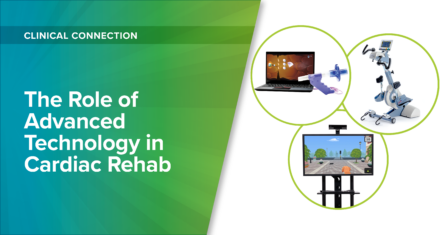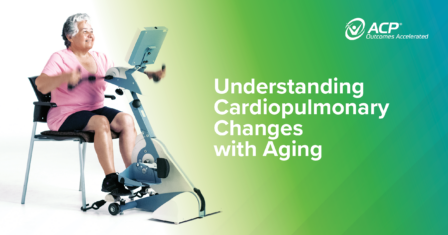According to the Centers for Disease Control and Prevention (CDC), coronary artery disease (CAD) is the most common type of heart disease in the US. It is caused by plaque build-up in the coronary arteries, which slows blood flow. The most common symptom of CAD is chest pain. However, many people don’t have symptoms and only find out they have CAD after suffering a heart attack.
With February being American Heart Month, it’s an opportune time to highlight the importance of cardiac rehab (CR) in supporting heart health and managing CAD. CR helps prevent future heart attacks, improves physical function, and enhances quality of life. A comprehensive CR program includes physical activity, education, and counseling. Advanced rehab technology can play a role in cardiac management, improving breathing and physical activity for individuals with CAD.
OmniFlow® Breathing Therapy Biofeedback System
In patients with stable angina, an 8-week inspiratory muscle training program improved respiratory and peripheral muscle strength, functional exercise capacity, and health-related quality of life.1 The OmniFlow Breathing Therapy Biofeedback System incorporates interactive, customizable, breathing exercises that help guide patients and their therapists.

Forced Inhalation

Forced Exhalation

Rhythmic Breathing

Controlled Expiration
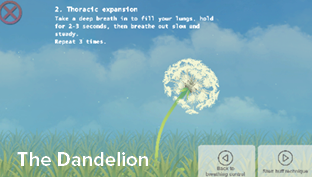
ACBT/Huff Technique
OmniVR® Virtual Rehabilitation System
A Cochrane Review of exercise-based CR in people with coronary heart disease found that exercise-based CR reduced the risk of heart attack, all-cause hospitalization, and cardiovascular mortality.2 Additionally, CR utilizing interactive virtual reality (VR) resulted in less pain, improved walking, higher energy levels, increased physical activity, and improved motivation and adherence.3 The OmniVR Virtual Reality Rehabilitation System combines gamified exercise with VR through interactive, customizable, seated and standing activities.
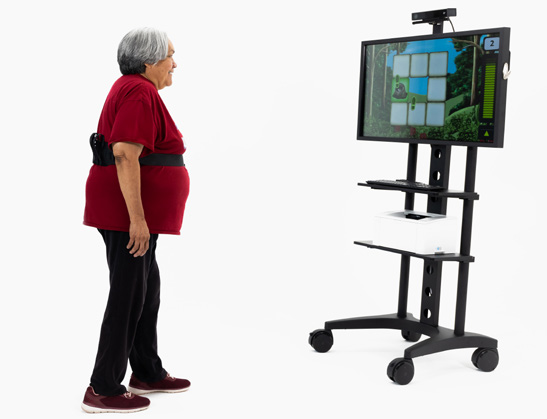
- Seated: Knee AROM, leg strength (Picnic)
- Sit-to-Stand: Trunk control, leg strength (Bingo)
- Balance and Gait: Dynamic balance, multidirectional gait (Mole, Flower Garden)
- Gait: Ankle/hip/stepping strategies (Walking the Dog)
- Upper Extremity: Sitting/standing balance, timed UE motion, functional reach (Carnival)
OmniCycle™ Advanced Active-Assist Cycle
The 2020 American Physical Therapy Association (APTA) clinical practice guideline for patients with heart failure specifically recommends cycling as a mode for aerobic and high intensity interval training.4 ACP’s OmniCycle Connect Advanced Active-Assist Cycle has innovative motor-assist technology and customizable exercises for patients with upper- and lower-extremity challenges. Paired with the OmniTour Virtual Exercise Experience, patients can enjoy an immersive VR cycling experience that motivates them to train more often and with greater effort.
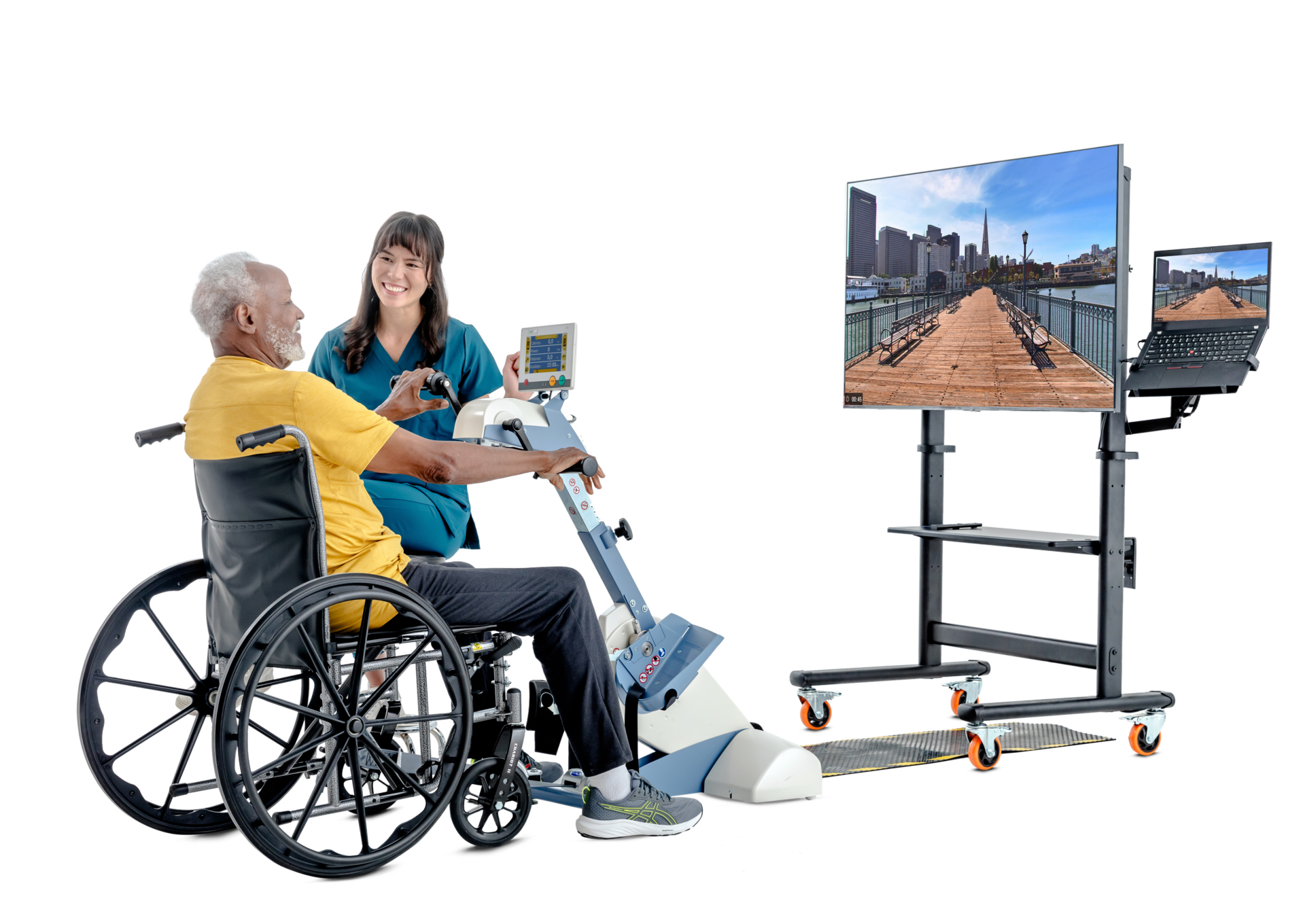
Upgrade Your Cardiac Rehab
Interested in learning more about how ACP’s advanced rehab technologies can enhance your cardiac rehab program?
- Huzmeli, I., Ozer, A. Y., Akkus, O., & Yalcin, F. (2022). The results of inspiratory muscle training on cardiac, respiratory, musculoskeletal, and psychological status in patients with stable angina: A randomized controlled trial. Disability and Rehabilitation,
1–12. Advance online publication. https://doi.org/10.1080/09638288.2022.2146767 ↩︎ - Dibben, G., Faulkner, J., Oldridge, N., Rees, K., Thompson, D. R., Zwisler, A. D., & Taylor, R. S. (2021). Exercise-based cardiac rehabilitation for coronary heart disease. The Cochrane Database of Systematic Reviews, 11(11), CD001800.
https://doi.org/10.1002/14651858.CD001800.pub4 ↩︎ - García-Bravo, S., Cuesta-Gómez, A., Campuzano-Ruiz, R., López-Navas, M. J., Domínguez-Paniagua, J., Araújo-Narváez, A., Barreñada-Copete, E., García-Bravo, C., Flórez-García, M. T., Botas-Rodríguez, J., & Cano-de-la-Cuerda, R. (2021).
Virtual reality and video games in cardiac rehabilitation programs. A systematic review. Disability and Rehabilitation, 43(4), 448–457. https://doi.org/10.1080/09638288.2019.1631892 ↩︎ - Shoemaker, M. J., Dias, K. J., Lefebvre, K. M., Heick, J. D., & Collins, S. M. (2020). Physical Therapist Clinical Practice Guideline for the Management of Individuals With Heart Failure. Physical therapy, 100(1), 14–43. https://doi.org/10.1093/ptj/pzz127 ↩︎
MRK-BLOG-019
According to the Centers for Disease Control and Prevention (CDC), coronary artery disease (CAD) is the most common type of heart disease in the US. It is caused by plaque build-up in the coronary arteries, which slows blood flow. The most common symptom of CAD is chest pain. However, many people don’t have symptoms and only find out they have CAD after suffering a heart attack. With February being American Heart Month, it’s an opportune time to highlight the importance of cardiac rehab (CR) in supporting heart health and managing CAD.

